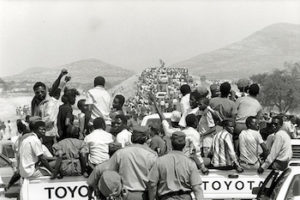
*On this date in 1990, Namibia gained independence from colonial rule. This repaired the invasion of the 1884 Berlin Conference, the high point of white European competition for territory in Africa, a process commonly known as the Scramble for Africa. Formerly South West Africa, Namibia’s population is 86 percent Black Africans.
The principal nonwhite group is the Ovambo, an agricultural people who live primarily in the North and makeup about one-half of the population. In 1915, during World War I, the then-German colony was conquered by military forces of the Union (now Republic) of South Africa. Germany renounced sovereignty over the region in the Treaty of Versailles, and in 1920, the League of Nations granted South Africa a mandate over the territory. In 1946 the United Nations (UN) General Assembly requested South Africa to submit a trusteeship agreement to the UN to replace the mandate of the defunct League of Nations; South Africa refused to do so.
The International Court of Justice, however, ruled in 1950 that the status of the mandate could be changed only with the consent of the UN. South Africa agreed to discuss the trusteeship question with a special committee of the General Assembly, but the negotiations ended in failure in 1951. South Africa subsequently refused to accede to UN demands concerning a trusteeship arrangement. Still, it permitted a UN committee to enter Namibia in 1962 to investigate charges of atrocities committed against the native peoples. Aroused by steps that the government of South Africa was taking to establish apartheid in the mandated territory, Ethiopia and Liberia took the case to the International Court of Justice. Still, the court dismissed the complaint in 1966 on technical grounds. In October of that year, the apartheid laws of South Africa were extended to the country.
The UN continued to debate the question, and in June 1971, the International Court of Justice ruled that the South African presence in Namibia was illegal. South Africa, however, continued to govern the territory. As a result, SWAPO, a Black African nationalist movement led by Sam Nujoma, escalated its guerrilla campaign to oust the South Africans. South Africa resisted eviction until December 1988, when it agreed to allow Namibia to become independent in exchange for removing Cuban troops from neighboring Angola. Open elections for a 72-member Constituent Assembly were held under UN supervision in November 1989, with SWAPO emerging as the majority party.
In 1990 the Constituent Assembly approved a new constitution and became the National Assembly; Nujoma was elected as the country’s first president, and Namibia attained independence. Until February 1994, South Africa administered an enclave containing the principal seaport, Walvis Bay. In 1994, the first elections following Namibian independence were held. SWAPO won 53 out of 72 seats in the National Assembly. The opposition DTA of Namibia obtained 15 seats.
